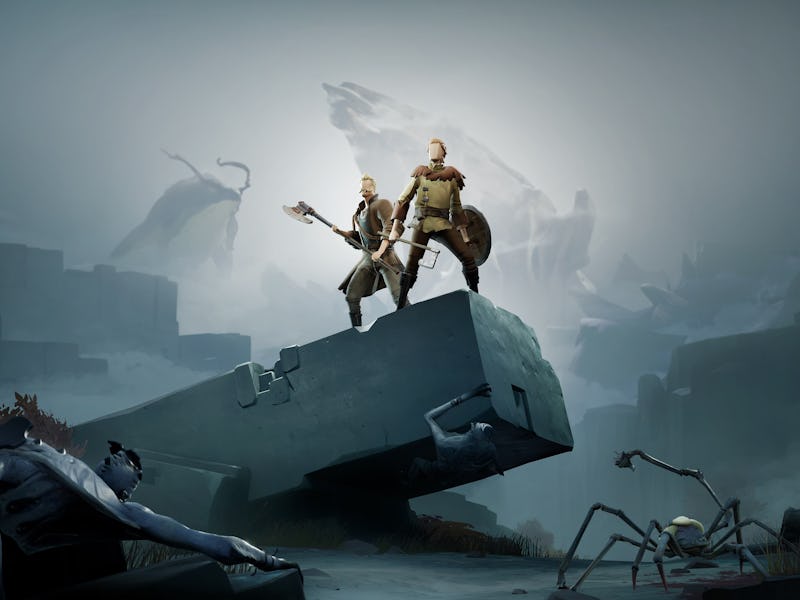How an Unexpected Indie Gem Turned the Dark Souls Formula On Its Head
It’s dangerous to go alone.

The Soulslike subgenre tends to be the domain of bleak, lonely games focused on testing your skill in combat. While that’s produced quite a few gems, it’s led to many more games that pale in comparison to the classics that inspired them. But of all the Soulslike games out there, there’s still only one I find myself returning to five years after its December 2018 release thanks to the way it uses the genre’s template to tell a more hopeful story.
At a glance, Ashen looks like any other Soulslike game. The first title from developer A44, its high-risk, high-reward combat will feel familiar to Dark Souls fans, and its opening area is full of dank caves and sparse wilderness, populated by bands of aggressive enemies.
Ashen’s combat should satisfy Dark Souls fans, but that’s not all it has going for it.
But from the outset, it’s clear Ashen is a riff on Dark Souls, not a copy of it. Its opening cutscene has a distinctly Souls-y vibe, recounting its world’s creation myth and the history of its cycles of light and dark. In Dark Souls, your quest starts as the age of fire comes to an end, with darkness encroaching.
Ashen, instead, takes place at the beginning of a new age of light. In the story’s cosmology, the Ashen is a godlike being whose presence fills the world with light. In the first few seconds of the game, the Ashen is reborn, having laid dormant through an age of darkness. Your job is to reach the Ashen before the forces of darkness and keep it safe.
While Ashen isn’t the kind of game where you’re following a story beat by beat, that atmosphere permeates your entire journey. Rather than the hopeless journey of Dark Souls, Ashen gives you the chance to build a better world.
The world of Ashen is a hostile place, but you don’t have to face it alone.
That conceit is also baked into its gameplay. Yes, there’s plenty of brutal combat, but Ashen is ultimately about creating a home worth fighting for now that hope has been reborn. Where Dark Souls had the Firelink Shrine, a desolate waypoint that gathered the downtrodden on their hopeless quest, Ashen instead gives you a tiny camp taken from bandits, which you’ll build into a community for the scattered survivors in the ruins. The further you get in the game, the more the town of Vagrant’s Rest will come to life, growing from little more than a campfire to a stable community full of NPCs.
Those NPCs are more than just set dressing for Vagrant’s Rest. In Ashen, you’re never alone — or at least, you’re never meant to be. From the very beginning of the game, you have an NPC companion capable of holding their own in a fight. You change them out as you meet new characters, and each has a game-spanning side quest centered on resolving a personal trauma, like ending a family curse or searching for a lost loved one.
What makes its NPCs even more special is that they’re not always NPCs technically. Any time you’re out exploring the world with a companion, they can be seamlessly replaced with another player. There’s no prompt to enter another player’s world and no indication that it’s even happened. You’ll just be connected to another player’s game, each of you appearing to the other as whichever companion they were adventuring with. That little trick makes each character feel more alive, even when they aren’t under a player’s control. Once you’ve slain a boss with a character and jumped for joy in celebration afterward, it’s hard to go back to seeing them as just an NPC again.
Ashen is set in a dead world slowly coming back to life.
Even Ashen’s difficulty helps reinforce the idea that it’s a game about cooperation. Traveling alone in Ashen is extremely punishing if you try to tackle it solo, with multiple dangerous enemies often attacking at once. Bosses and regular enemies alike reward teamwork over sheer skilled play. Companions can revive each other if one falls and draw foes’ attention away so their partner can heal. By tuning its combat to be frustratingly difficult for solo players, it subtly hints that working together is the way to survive.
Finishing Dark Souls for the first time felt almost like a spiritual experience for me, its themes of breaking cycles and persisting in the face of hopelessness coming at a time when I truly needed them. Despite that, few Soulslike games have ever managed to draw me in. In almost every case, it feels like they’re missing — well, their souls.
In a genre that often feels like all it has to offer is difficulty and dread, Ashen instead explores what other meanings it can draw out of that harshness, and what different worlds could emerge from an age of darkness.